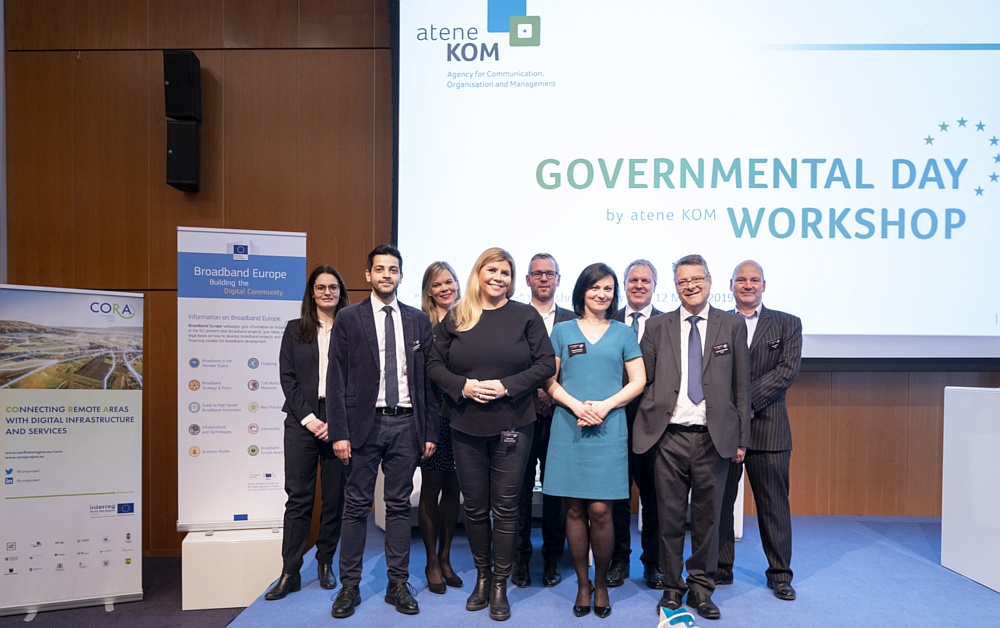The “Governmental Day” workshop took place in Amsterdam on March 12, 2019. Together with the FTTH Council Europe aconium GmbH organized the event format for the fifth time. As part of the FTTH Conference European broadband policy stakeholders and representatives from municipalities and regions exchanged views. In particular, they discussed the challenges and prospects of digitization in rural regions. Strategies for achieving the gigabit society, EU funding opportunities, specific local initiatives for broadband expansion and supra-regional projects – including the aconium project CORA to promote digital infrastructure and services in rural areas – took center stage. One conclusion: citizens must be involved and civic engagement at local level must be supported in order to master the digital transformation.
Peyman Khodabakhsh (Project Manager CORA, aconium) welcomed around 150 participants with an overview of the state of broadband coverage in Europe. He illustrated the challenges for the digital development of rural areas with some figures: 30 percent of the inhabitants of rural regions in Europe have no digital skills whatsoever. At the same time, there is still a discrepancy between network availability and network usage: 60 percent of European households already have fast network access (100 Mbit/s or higher), but only 15 percent actually use it.
European broadband policy and examples
Alexandra Rotileanu, European Commission, DG Connect, opened the presentation section with a policy update. She explained the European Commission’s broadband strategy and emphasized the three gigabit targets to be achieved by 2025:
- Gigabit-speed network connections for socio-economic drivers such as schools, business parks, research facilities and hospitals,
- Uninterrupted 5G availability along important transport infrastructures (roads, railroads)
- Internet connections with data transfer rates of at least 100 Mbit/s for all European households
She emphasized the financial support for the broadband sector through the current Multiannual Financial Framework (MFF) and explained in particular the telecom sector under the Connecting Europe Facility (CEF), which also includes the Connecting Europe Broadband Fund (CEBF) and the WiFi4EU initiative. The new MFF 2021 to 2027 will allocate around three billion euros to the CEF DIGITAL funding strand and support synergies with transport and energy networks, for example, in order to enable the digital transformation. Rotileanu was pleased with the success of the WiFi4EU program: the vouchers for European municipalities for the installation and purchase of WiFi equipment were exhausted within the first hour of the first call for funding. The next call is expected in spring 2019.
After presenting successful local roll-out projects in Wales and Sweden – both among the winners of the European Broadband Awards 2018 – Maija Ahokas from the Finnish Ministry of Transport and Communications explained the importance of digital infrastructure for the future of the economy and society using the example of Finland. Jorge Infante Gonzalez (Body of European Regulators for Electronic Communications, BEREC) explained the approach to fine-tune the regulatory framework for electronic communications markets based on different geographical areas and market and competitive conditions. The Co-Chair of the BEREC Expert Group on Market and Economic Analysis explained how to ensure an independent, consistent and high quality application of the European regulatory framework for the benefit of European Member States. Christian Zieske (aconium) discussed the possibilities of using data to create maps and successfully plan the expansion of digital infrastructure with the help of geoinformation systems(GIS).
CORA – COnnecting Remote Areaswith digital infrastructure
Finally, Peyman Khodabakhsh and Wouter Degadt (Leiedal) presented the CORA(COnnecting Remote Areaswith digital infrastructure) project. The project uses the triad of digital infrastructure, digital services and digital skills to make rural regions fit for the future. The CORA pilot regions presented illustrated the diversity of the digital transformation. Some examples:
- In Leiedal (Belgium), a smart business park with open access fiber optic infrastructure is part of the project. The data collected there with the help of sensors and cameras is used to measure air quality, among other things, but also to ensure the safety of the business park.
- The THINK project at the University of Lincoln (UK) is about bringing people and technology together in a meaningful way to spark interest, initiate educational processes and thus promote innovation in the Lincolnshire region.
- In Syddjurs (Denmark), a digitally equipped bus is part of the project. Together with four project employees, it helps to bring patients and families closer to the topic of dementia and make it easier to deal with.
- Amt Hüttener Berge (Schleswig-Holstein) has developed a digital citizen portal that is used by the municipalities in the rural region. The e-government that many places are striving for is thus becoming a reality in this small municipality.
As part of CORA, there is now an e-learning offer that gives local authorities and decision-makers an understanding of digital infrastructure, digital skills and digital services, their possibilities and implementation.
The interactive final part of the workshop also focused on ideas for involving local stakeholders and citizens. At the three themed tables on digital infrastructure, digital services and digital skills, the participants discussed measures that contribute to improving and promoting these dimensions. Conclusion: The increased involvement of stakeholders in rural regions is essential in order to drive forward digitization across the board. Local and regional initiatives must be supported by both national governments and the European side. In addition to the digital infrastructure, which is the basis of Europe’s future viability, the applications (digital services) and skills (digital competencies) of citizens must also be given greater attention.
Background
The fifth “Governmental Day” workshop took place as part of the FTTH Conference 2019 in Amsterdam. The presentations of the participants and further photos are available on the event page.
With 3,000 participants from almost 100 countries, the FTTH conference is the world’s largest meeting place for broadband players. On 10,000m2, industry leaders, experts and decision-makers showcased fiber optic technologies and discussed ICT policy and the financing of broadband expansion.

